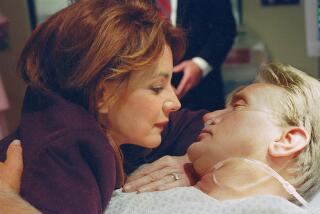A Watch, a Shoe and a Cold War Tale
- Share via
“Khrushchev? The one who banged a shoe?”
Not again! I wish it had never happened, I thought for the thousandth time when I was asked for the thousandth time if I had seen pictures of the U.N. shoe incident.
I hadn’t and didn’t want to. For all these years, I was slightly embarrassed by my grandfather’s uncivilized behavior, exposed the world over.
In fact, my whole family was, so we never talked about it. Besides, Nikita S. Khrushchev’s name was not officially mentioned in the Soviet Union for 20 years after he was dismissed as premier in 1964; as far as the authorities were concerned, the incident had never happened, nor had Khrushchev. But after 40 years, during the U.N. Millennium Summit, I decided it was time to face the truth.
Surprisingly, however, the books I found on international and Soviet politics were inconsistent about the causes and timing of the event. This made me suspicious. Why are the versions so different? Were there pictures? What if it had never happened? What if it was just an anecdote created by public demand, consistent with political needs of the socialist-capitalist division?
A scandalous shoe-banging so conveniently fit the general mode of Khrushchev’s behavior. He was well known for interrupting speakers, banging his fists on the table in protest, pounding his feet, even whistling in disagreement. None of this, however, was enough to be transformed into a physical symbol of the Cold War. The shoe, on the other hand, fit right in: Its lowly place had boldly been moved up to the table (tough revolutionaries and manners don’t go together) in order to “stamp its foot,” signifying the oppressive character of socialism. The sound of a shoe pounding the table was a distinctive Cold War feature, as much as the sound of a gun firing denotes a “hot” war.
The shoe-banging incident conveyed, for the West, a convenient ideological message: Our enemy is ridiculous and uncivilized, therefore he is capable of everything. We too then have to be prepared for anything.
Studying old newspapers as the best record of contemporary events, I felt as if I was in New York that fall of 1960. Fifteen years had elapsed since the end of World War II. Humanity had survived, and East and West were now fighting another war of words and ideologies. Cuba’s Fidel Castro was making a big stir. “Hurricane Nikita” used every opportunity to be difficult. President Eisenhower did not try to defuse tensions.
On Oct. 12, 1960, there it was on the front page of all national newspapers: the picture I was looking for so persistently and yet so dreaded seeing. The head of the Philippine delegation to the U.N., Lorenzo Sumulong, was surprised at the Soviet Union’s concerns over Western imperialism, since the Soviets had swallowed the whole of Eastern Europe. Khrushchev’s reply was angry. He called Sumulong “a jerk, a stooge and a lackey of imperialism,” put his shoe on the desk and banged it.
When Khrushchev left the U.S. the next day, he was done with the incident. And when I read about it, I was done with feeling ashamed. In trying unsuccessfully to rehabilitate my grandfather in the world’s eyes, I rehabilitated him in my own eyes by understanding his behavior. He felt that the Soviet Union was mistreated by the Western powers: Spy planes flew over Russia; the U.S. imposed an embargo on Cuba; the West rejected the Soviet Union’s new disarmament plan.
Capitalists thought of him as a vaudeville character. Fine, he would use the United Nations’ stage to show them that he should be taken seriously as a worthy opponent. But he would do it in a manner different from the polite hypocrites of the West with their appropriate words, false niceties and calculated deeds. A provokingly dramatic (or tragi-comic) act of shoe-banging was supposed to separate two worlds, not only in terms of their titles and their politics but also in their means of making diplomacy.
As a good performer, Khrushchev needed a strong, convincing exit from the U.N. and the U.S. In the excitement of fist-banging at the Filipino’s words, his watch fell off. Meanwhile his shoes, made of durable Soviet leather, were too new and too tight, and he removed them. He bent down to pick up the watch and saw an empty shoe. These insights I learned from my family. Since the 40-year spell of embarrassment was broken, we were finally ready to talk about those times.
I still think that, had the shoe-banging not happened, it would have been invented. The best anecdote is always the one that truly reflects the morality and character of certain times. The shoe incident became a real symbol of the Cold War, probably the only war in which fear and humor peacefully coexisted.
Today it is old hat--or old shoe. The old U.N. stage has new leaders and new wars and fears. But I find it comforting to know that at times, history gives us a chance to replace a horrifying reality with a funny anecdote.
More to Read
Sign up for Essential California
The most important California stories and recommendations in your inbox every morning.
You may occasionally receive promotional content from the Los Angeles Times.













